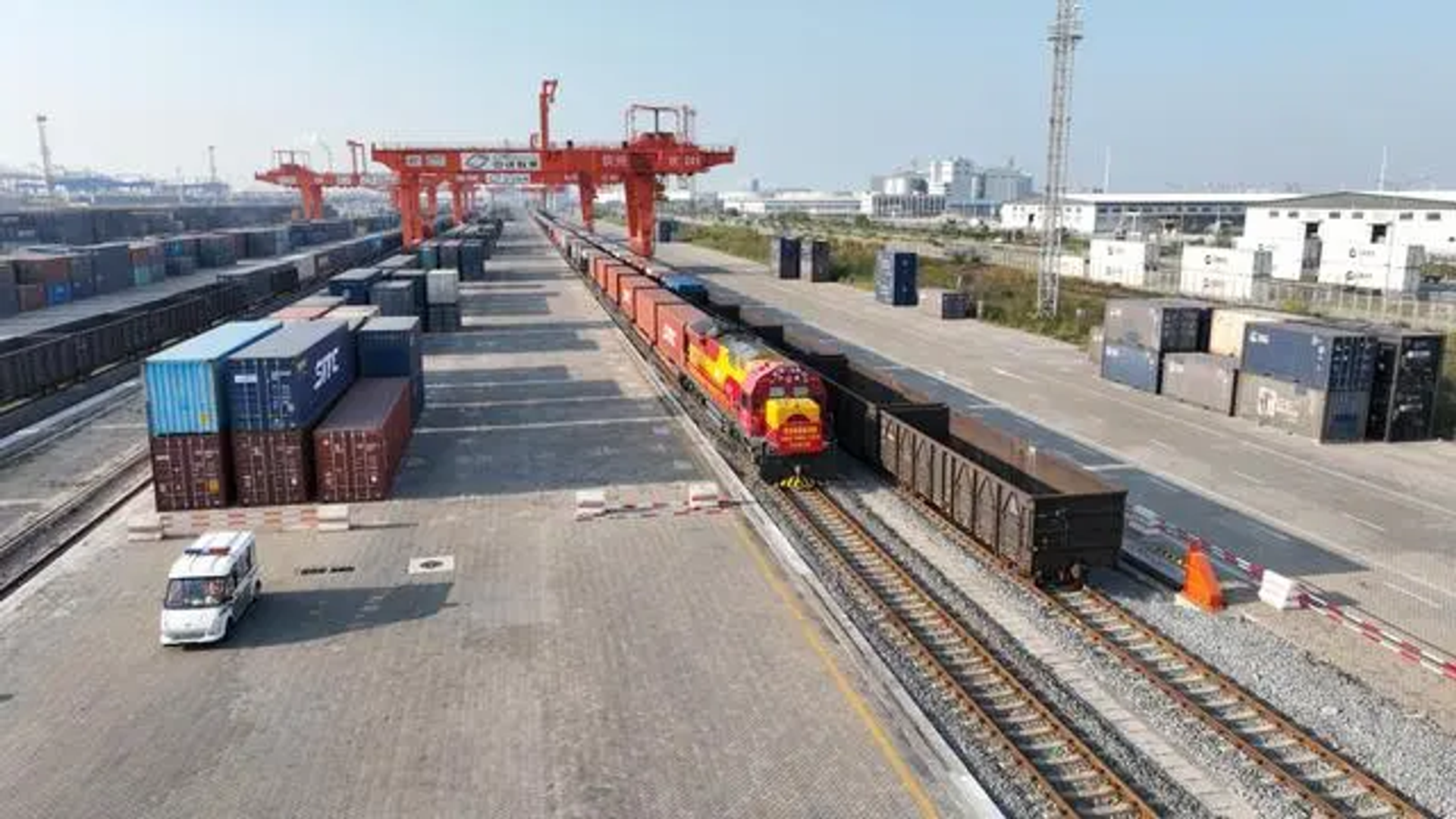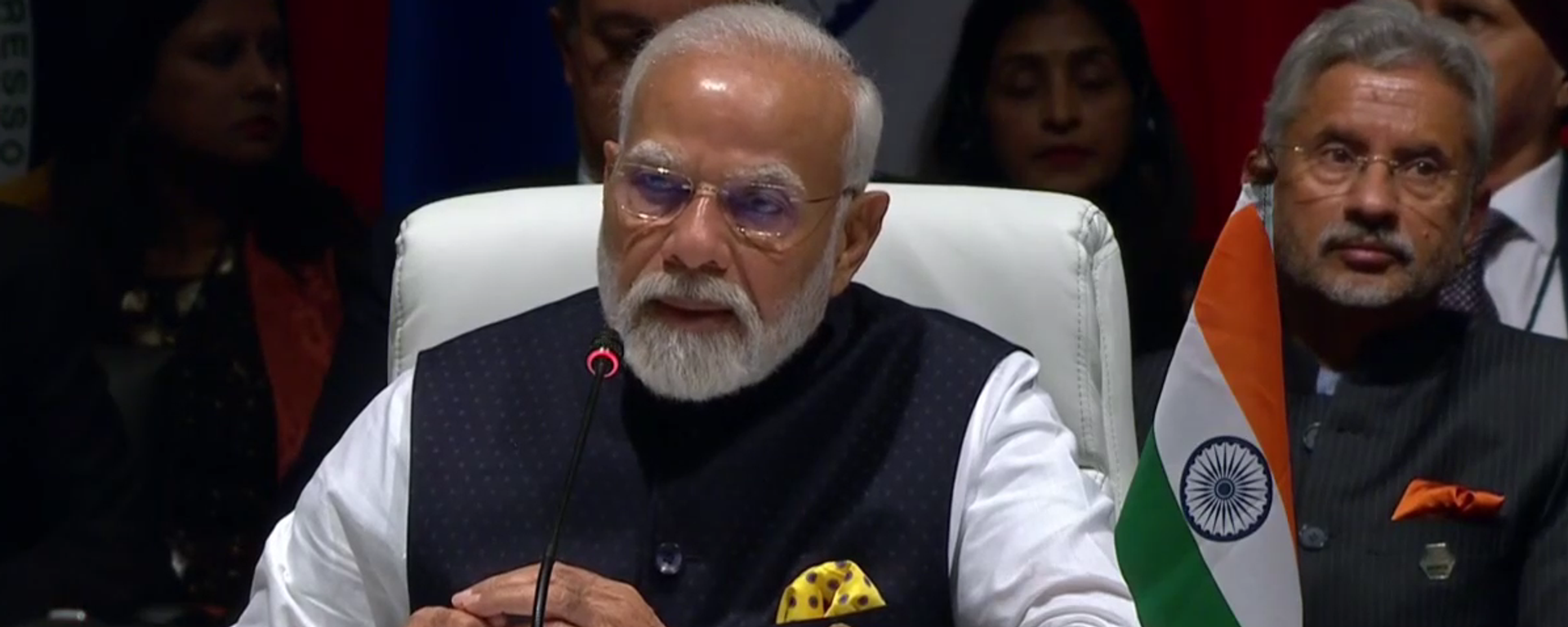https://sputniknews.in/20230831/russia-can-expand-trade-and-investment-in-bangladesh-by-five--3886680.html
Russia Can Expand Trade and Investment in Bangladesh by Five Times
Russia Can Expand Trade and Investment in Bangladesh by Five Times
Sputnik India
India hosted the official G20 dialogue forum with the global business community – B20 Summit – from August 25-27 in the national capital city of New Delhi.
2023-08-31T16:23+0530
2023-08-31T16:23+0530
2023-08-31T18:32+0530
india
brics
bangladesh
russia
new delhi
world news
dedollarisation
trade corridor
free trade agreement (fta)
trade barriers
https://cdn1.img.sputniknews.in/img/07e6/0c/0d/84398_0:0:640:360_1920x0_80_0_0_4b70f06aed0bb59e79e7c2806d0c66ce.png
The three-day B20 Summit in the city witnessed participation from trade ministers of various countries along with several business leaders discussing global issues related to commerce and trade.The summit started with the session on B20 Indian Priorities and Recommendations: From India for the World. Apart from this, various sessions related to sustainable global economic recovery, cyber security risks, and financial inclusions for economic empowerment were organized during the summit.On the sidelines, President of the India-Bangladesh Chamber of Commerce and Industries (IBCCI) and Chairman of Nitol-Niloy Group of Bangladesh Abdul Matlub Ahmad shared his views on the impact of trade between India and Bangladesh in Indian rupees and de-dollarization along with other issues in an interview with Sputnik.Sputnik India: Last month, India and Bangladesh rolled out bilateral trade in Indian rupees. What are the challenges and opportunities for both countries in terms of trade in national currency?Ahmad: With the US dollar crisis in Bangladesh, we wanted to see the possibilities of using a third currency for trade, especially between India and Bangladesh. So, it has started, as the first LC (letter of credit) to us has been given by Tata Motors and the ship has already reached Bangladesh.The policy here is that export has to be done in Indian rupees, then Bangladesh can use that rupee to import. So, this has a huge impact as we don’t need to look for dollars and the price is fixed in Indian currency which fluctuates less.So, any bilateral currencies used between the two countries will always have good benefits for each other. I believe this will go a big way for the development of the business between India and Bangladesh using no hard currency.Sputnik India: Some economists and financial analysts have expressed skepticism over trading in Indian rupees due to a huge trade imbalance. How do you see the trade in Indian rupee?Ahmad: I would like to cite an example of India and Russia. If you look at trade in Indian rupees, they did not keep the trade balance in mind rather they did it just one way. So, Indian rupees are piled up in Russia.However, what Bangladesh did is that its trade with India is $16 billion of which $14 billion is import and $2 billion is export. So, we have limited it to $2 billion so that matching funds are there which India-Russia didn’t do.So, the charm of this is that you don’t need to balance each other’s trade, rather do the trade up to which you are sure of balancing which was $2 billion for Bangladesh and we did it and it’s working fine.Sputnik India: How do you assess the current push for de-dollarization globally?Ahmad: We need to understand one thing - that de-dollarization is not possible in the near future. However, reducing the usage of hard currency is possible up to a limit. So, I feel that the way the whole world is working towards the usage of bilateral currencies will reduce the usage of the US dollar to 10-15 percent.As of now, we can’t think of more reduction in terms of usage of US dollars in the near future. But going by the ongoing trend of trade in bilateral currencies, I can say that the world will get a new way of working, and maybe one day currencies like the Russian ruble, Indian rupee, and Chinese yuan will become big currencies in world trade.Sputnik India: Apart from India, which are the promising trade partners for Bangladesh? Is Russia among them?Ahmad: Definitely, Russia is one of the promising and very futuristic trade partners for Bangladesh. The only nuclear plant of Bangladesh for power generation is coming from Russia. We're getting all help from Russia, as well as India.However, I personally believe that Russia can expand trade with Bangladesh five times as compared to the current trade. Neither there is any concentration of exploration from the Russian side in Bangladesh nor vice-versa.I believe that if both nations look more deeply, trade as well as investments can be expanded five times.
https://sputniknews.in/20230828/india-ready-to-support-genuine-efforts-to-achieve-peace-in-ukraine-modi-3882960.html
india
bangladesh
russia
new delhi
Sputnik India
feedback.hindi@sputniknews.com
+74956456601
MIA „Rossiya Segodnya“
2023
Rahul Trivedi
https://cdn1.img.sputniknews.in/img/07e6/0c/13/136500_0:0:628:627_100x100_80_0_0_72097ff894c7446b70d2efafcb719720.jpg
Rahul Trivedi
https://cdn1.img.sputniknews.in/img/07e6/0c/13/136500_0:0:628:627_100x100_80_0_0_72097ff894c7446b70d2efafcb719720.jpg
News
en_IN
Sputnik India
feedback.hindi@sputniknews.com
+74956456601
MIA „Rossiya Segodnya“
Sputnik India
feedback.hindi@sputniknews.com
+74956456601
MIA „Rossiya Segodnya“
Rahul Trivedi
https://cdn1.img.sputniknews.in/img/07e6/0c/13/136500_0:0:628:627_100x100_80_0_0_72097ff894c7446b70d2efafcb719720.jpg
b20 summit, trade ministers, nitol-niloy group of bangladesh abdul matlub ahmad, bangladesh chamber of commerce and industries, ibcci, sustainable global economic recovery, cyber security risks, financial inclusions, economic empowerment, indian rupee, russian ruble, indian rupee, chinese yuan
b20 summit, trade ministers, nitol-niloy group of bangladesh abdul matlub ahmad, bangladesh chamber of commerce and industries, ibcci, sustainable global economic recovery, cyber security risks, financial inclusions, economic empowerment, indian rupee, russian ruble, indian rupee, chinese yuan
Russia Can Expand Trade and Investment in Bangladesh by Five Times
16:23 31.08.2023 (Updated: 18:32 31.08.2023) India hosted the official G20 dialogue forum with the global business community – B20 Summit – from August 25-27 in the capital city of New Delhi.
The three-day B20 Summit in the city witnessed participation from trade ministers of various countries along with several business leaders discussing global issues related to commerce and trade.
The summit started with the session on B20 Indian Priorities and Recommendations: From India for the World. Apart from this,
various sessions related to sustainable global economic recovery, cyber security risks, and financial inclusions for economic empowerment were organized during the summit.
On the sidelines, President of the India-Bangladesh Chamber of Commerce and Industries (IBCCI) and Chairman of Nitol-Niloy Group of Bangladesh Abdul Matlub Ahmad shared his views on the impact of trade between India and Bangladesh in Indian rupees and de-dollarization along with other issues in an interview with Sputnik.
Sputnik India: Last month, India and Bangladesh rolled out bilateral trade in Indian rupees. What are the challenges and opportunities for both countries in terms of trade in national currency?
Ahmad: With the US dollar crisis in Bangladesh, we wanted to see the possibilities of using a third currency for trade, especially
between India and Bangladesh. So, it has started, as the first LC (letter of credit) to us has been given by Tata Motors and the ship has already reached Bangladesh.
The policy here is that export has to be done in Indian rupees, then Bangladesh can use that rupee to import. So, this has a huge impact as we don’t need to look for dollars and the price is fixed in Indian currency which fluctuates less.
So, any bilateral currencies used between the two countries will always have good benefits for each other. I believe this will go a big way for the development of the business between India and Bangladesh using no hard currency.
Sputnik India: Some economists and financial analysts have expressed skepticism over trading in Indian rupees due to a huge trade imbalance. How do you see the trade in Indian rupee?
Ahmad: I would like to cite an example of India and Russia. If you look at trade in Indian rupees, they did not keep the
trade balance in mind rather they did it just one way. So, Indian rupees are piled up in Russia.
However, what Bangladesh did is that its trade with India is $16 billion of which $14 billion is import and $2 billion is export. So, we have limited it to $2 billion so that matching funds are there which India-Russia didn’t do.
So, the charm of this is that you don’t need to balance each other’s trade, rather do the trade up to which you are sure of balancing which was $2 billion for Bangladesh and we did it and it’s working fine.
Sputnik India: How do you assess the current push for de-dollarization globally?
Ahmad: We need to understand one thing - that de-dollarization is not possible in the near future. However, reducing the usage of
hard currency is possible up to a limit. So, I feel that the way the whole world is working towards the usage of bilateral currencies will reduce the usage of the US dollar to 10-15 percent.
As of now, we can’t think of more reduction in terms of usage of US dollars in the near future. But going by the ongoing trend of trade in bilateral currencies, I can say that the world will get a new way of working, and maybe one day currencies like the Russian ruble, Indian rupee, and Chinese yuan will become big currencies in world trade.
Sputnik India: Apart from India, which are the promising trade partners for Bangladesh? Is Russia among them?
Ahmad: Definitely, Russia is one of the promising and very futuristic trade partners for Bangladesh. The only nuclear plant of Bangladesh for power generation is coming from Russia. We're getting all help from Russia, as well as India.
However, I personally believe that
Russia can expand trade with Bangladesh five times as compared to the current trade. Neither there is any concentration of exploration from the Russian side in Bangladesh nor vice-versa.
I believe that if both nations look more deeply, trade as well as investments can be expanded five times.



